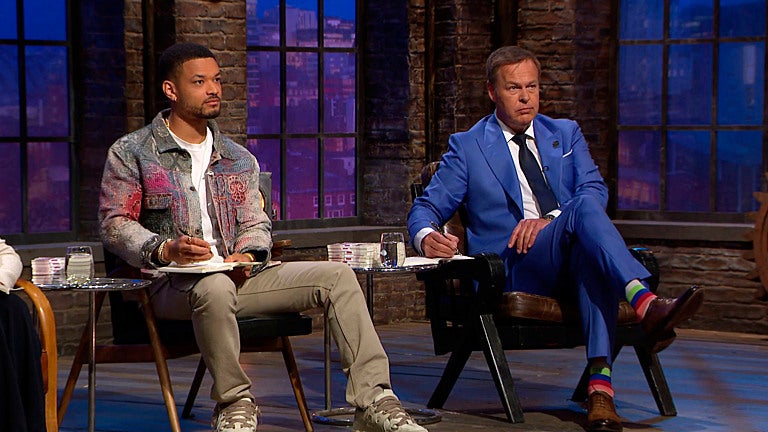Downfall of a CEO? The real reason Steven Bartlett became the man we love to hate
Bartlett faced public criticism last week after the watchdog sensationally banned “misleading” health adverts he appeared in. But that’s not the real problem, says Zoe Beaty


CEO, podcast host, author, investor, self-proclaimed Happy Sexy Millionaire... Steven Bartlett has never been short of accolades. His narrative is tight. Bartlett is the university dropout who grew up in financial hardship but made a million by 23.
Today, he’s the youngest investor to get a seat in the BBC’s Dragons’ Den and, over the years, Bartlett has gained a reputation as an entrepreneurial renegade and wellness guru. More than 10 million people download his cult podcast, Diary of a CEO, every month; his book of the same name – as well as his memoir, which really is titled Happy Sexy Millionaire – is a best-seller.
Forbes magazine valued his social media and investment empire at £71m when he was just 26 years old. He came from little and made a lot – a perfect rags-to-riches story.
And yet...
People really don’t like Steven Bartlett. Like, huge swathes of people. They don’t like the way he speaks. Based on no intimate knowledge of him at all and just a feeling, all kinds of people will tell you they think he’s a “narcissist”, a ”grifter” “a hustler”.
“He’s a new-age hippy but made all his money in marketing and social media,” another twined recently. “He just promotes quacks and mad health theories,” says another. More gripes: “He lets people like Matt Hancock whinge to him about being in love on his podcast.” “He wears fancy clothing.” I just find him very smug.”
These are not unique opinions. In fact, social media platforms are full of them – last week more vehemently than most.
On Wednesday, Bartlett’s advertising deal with “nutritionally complete” food brand Huel and wellness programme app Zoe was sensationally pulled by the Advertising Standards Authority (ASA).
The paid-for promotions on Facebook, shared in February, featured Bartlett alongside an endorsement that Huel’s daily greens drink is the brand’s “best product”; another, in which Bartlett is pictured with a Zoe patch on his arm, he claims the app “might just change your life”.
Unfortunately, the ads failed to declare some pretty important information: Bartlett is an investor in both brands. Several complaints were made challenging whether the omission of his commercial interest in the two brands was misleading to the public. The ASA agreed that it was.

It’s fair to say people were quite angry. “Why did he think he would get away with it?” Ryan T Williams, who co-founded It’s Gone Viral, a competitor of Social Chain, the company that began Bartlett’s career, said last week. “It’s not only a legal obligation but a moral one too. This is like the guy who owns McDonald’s telling you, ‘Big Macs are good for you’.”
This latest scandal is a small peak in the mountain of backlash Bartlett faces for his influential position in “wellness culture”. It’s barely six months since he found himself embroiled in another health scandal involving Acu Seeds, an “ear-seeds” acupuncture company that appeared on Dragons’ Den.
Bartlett made a significant investment but, when the episode attracted mass criticism – Giselle Boxer, who founded the company, was accused of “selling snake oil” after claiming a similar product helped her recover from myalgic encephalomyelitis (ME) – it was temporarily removed from the BBC. Bartlett’s brother Jason, not Steven himself, was listed as a director.
Born in Botswana, his Nigerian mum and British dad moved Bartlett and three older siblings to Plymouth, Devon, when he was two. It was a “nice, white middle class” area where they struggled financially, he says.
After scraping through school, he left his business management course at Manchester Metropolitan University after attending one lecture. It was then he set up Social Chain, with friend and business partner Dominic McGregor.
The company, a social media and marketing brand, was undoubtedly very successful. But as it grew, and reports of its value began to emerge, eagle-eyed fans noticed that something seemed off. In 2021, its revenue expectations were reported as more than £500m. In 2023, reports said that had risen to almost £1bn. Yet, the same year, the company sold in an acquisition deal for just £7.7m.

To his admirers, his wealth appeared to have been overstated. Bartlett took to X (formerly Twitter) to clarify the situation – he sold the “original agency business we had started in [Manchester] almost 10 years ago”, he said, not the rest of the 30-plus company portfolio under the umbrella of Social Chain. But a seed was already planted.
Nick Stylianou says the details of Bartlett’s success and “inspirational” mission began to be questioned. He’d exaggerated to make him “part of some grand self-mythology”, he says, “instead of simply a very talented young man who’d done well for himself,” he says. “The British people love an underdog and cheer on the rags-to-riches story, but the turbo-LinkedIn brags” – like 250-word posts about his brave decision not to wear suits on Dragons’ Den, for example – “just rub people up the wrong way.”
Stylianou went viral this week for posting an embarrassing video of Bartlett battle rapping as alter-ego “Lyricist”. The CEO had previously tried to have the videos removed from the internet in an attempt to “polish” his image.
His podcast, business investments, social media empire, and his TV appearances mean he does put the hours in, and to good effect. He is a standout at what he does – marketing – especially when it comes to himself. “I love him,” a couple of people confess when I gather opinions. “I think he hires very well, too. He’s got a great team.”
Holly Peacock-Goodwin is a fan. “I love his interview style on the podcast,” the brand director says. “He asks the questions other people might not dare as they might reveal their own ignorance.” She references an episode in which he interviews Dr Mary Claire Haver titled “The No.1 Menopause Doctor: They’re Lying To You About Menopause! Brand New Science! (Men Need To Listen Too!)”.
The episode saw him ask questions on a subject “he really didn’t have a clue about,” she says, “and a lot of men (and women) don’t either. So I thought that was great.”
But, while Bartlett is often praised for making very listenable podcasts, he receives just as much negativity for the people he platforms on Diary of a CEO, especially when it comes to wellness myths, fads and, some say, health charlatans.

In the past, he’s interviewed Gary Brecka, a self-proclaimed “human biologist” who says he can predict a person’s death to the exact month, and that Alzheimer’s disease is a type of diabetes. He has no medical degree, and his claims that excess folic acid from food causes ADHD are not based on any evidence.
Billionaire Bryan Johnson, who claims he’s going to live forever by reversing his ageing with 111 pills per day and a vegan diet has also been featured. According to Stylianou, Bartlett is “in an echo chamber of people agreeing with his quest to tell you how and why you’ve been living your life wrong”.
“My problem with Bartlett is that he’s set up as a pseudo-intellectual, a public figure now running vanity publications to embed himself in the media landscape.”
Bartlett appears to be the epitome of an emergent culture of marginally successful people deciding they’re experts on everything – but he can’t be held responsible for that in its entirety. He’s in good company.
Other podcast bros like Joe Rogan – an MMA expert turned cult-like figure – or Jordan Peterson, once simply a clinical psychologist now a right-wing conspiracist with all the answers, are sitting in the same studio.
Maybe he’s manipulative, maybe he’s profiting off an unstable economy, where young people facing a difficult jobs market want new ways to get rich – and powerful – quick.
There’s almost certainly a lack of clarity and third-party witness to his story that sits uncomfortably around him. However, let’s not be shy about it: there’s also a strong sense of schadenfreude surrounding the awaited downfall of this CEO.
But look – still. Here we are, talking about Steven Bartlett. Like him or not, it’s obvious: his marketing strategy is working. The pedestal may be shaking, but it hasn’t crashed to the ground just yet. This article was amended on 19 August 2024. It previously said that Bartlett ‘got his knuckles rapped by the ASA’, but that was incorrect. The ASA rulings were against the brands and not against Bartlett.
Subscribe to Independent Premium to bookmark this article
Want to bookmark your favourite articles and stories to read or reference later? Start your Independent Premium subscription today.

Join our commenting forum
Join thought-provoking conversations, follow other Independent readers and see their replies
Comments